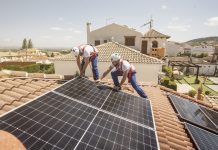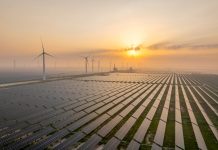Simon Bushell, CEO, Sympower, ponders why the energy price crisis in Europe calls for a rapid response
Europe is experiencing a record-breaking surge in energy prices, recording multi-year highs. Energy-intensive manufacturing businesses, such as those in the glass, steel, paper, cement and chemicals industries, could bear the brunt of this by being asked to temporarily close plants down while they assess their winter production plans.
Energy analysts are warning that the run on energy prices is likely to continue throughout the winter, creating nervousness in the markets, with no immediate end in sight.
In the UK for example, energy prices have soared, and wholesale electricity prices are now the most expensive in Europe due to the country’s dependence on gas and renewables.
The Netherlands has become far more dependent on foreign gas imports following the closure of the earthquake-stricken Groningen gas fields and gas prices have broken the structural €100 for a megawatt-hour (MWh) for the first time in years.
We are witnessing a perfect storm that is impacting the supply of natural gas. Demand was up last year due to an exceptionally cold winter – something European energy providers will be praying doesn’t repeat itself. The COVID 19 pandemic prevented essential gas supply maintenance work impacting the replenishment of reserves; and renewable generation of electricity from wind power was hit by calm weather conditions. The result? A quadrupling of wholesale gas prices over the last 12 months.
Integrating renewable energy requires greater flexibility
The current EU energy crisis highlights the need for greater independent energy production. We need to think more strategically rather than simply relying on wind and solar technologies because we all know what happens when the wind doesn’t blow and the sun doesn’t shine. Flexibility, such as demand-side response (DSR) and energy storage need to play a far greater role in securing Europe’s energy supply.
In order to successfully transition towards a fully renewable energy system, ‘flexibility’ will be a crucial building block. But what does this mean? Simply, flexibility provides customers with the option to add, lower, change or postpone the production and/or consumption of electricity.
For example, businesses, such as those operating an energy-intensive production line, might decide to shift production while energy prices are high and resume when prices drop.
The transition towards net-zero and a renewable energy system will not be a smooth and simple ride. Increasing the amount of renewable energy on the grid comes with its own unique set of challenges. One of the main ones being how to balance the grid and provide a safe and secure supply of electricity while managing additional distributed energy supplies.
Despite this current intermediate phase, which sees the gradual phasing out of coal to provide electricity, many countries are still heavily dependent on gas. What is needed is more space for flexibility to prove its worth. One of the most efficient ways to achieve this is by allowing independent aggregators to offer DSR and energy storage services.
Regulatory support for DSR
Despite EU directives and regulations in place to allow independent aggregators access to electricity markets, they are not being implemented effectively by member states. Generally, policy changes are slow at this level due to the influence of traditional energy companies, who push back against independent aggregators as they see them as a threat to their business model.
If we look at countries that have already allowed independent aggregators to enter the market, such as the UK and France, we can see that the positive impact they have on a higher uptake of these services has no negative effects on energy security or supply.
More independent aggregators need to enter the market to help shape the electricity systems of the future. This will help accelerate the global transition towards ‘net zero’ by developing smarter, cleaner renewable energy systems that are capable of relieving spikes in European energy supply and demand.
There’s a degree of short-sightedness when it comes to assessing the future design of our energy systems, and also understanding how best to integrate new energy sources to meet future demand. We need to adopt a more holistic ‘systems thinking’ approach to help alleviate potential energy crises and reduce our dependency on non-domestic sources of energy production.
Winter is coming, wholesale energy prices are at record highs and there’s little Europe can do in the short term to address supply-side issues. Now is the time to look more closely at how flexibility, in all of its various forms, can help countries achieve energy transition goals and provide reliable and highly functional energy systems capable of meeting future energy requirements.











